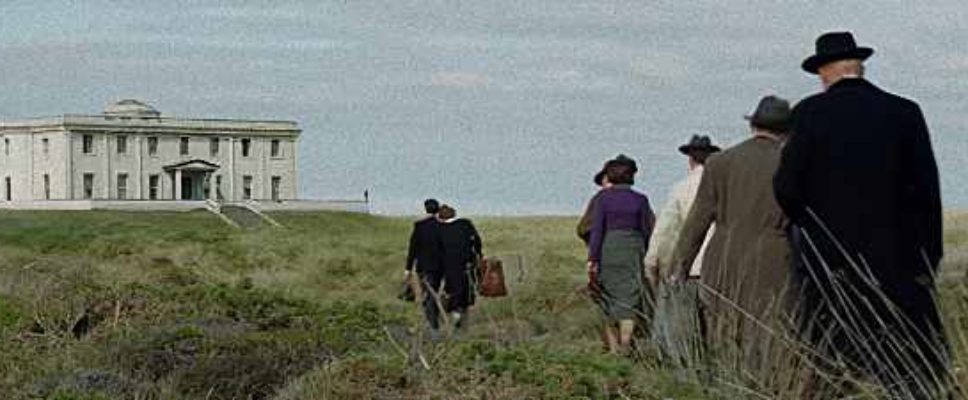Teresa Reviews “And Then There Were None” (2015)
Teresa reviews “And Then There Were None” (2015) and thought Sarah Phelps version killed it.
Fidelity to text: 4½ weapons
 The typical adaptation sticks with the play’s ending. This is the novel: gruesome, paranoid, atmospheric, horrifying, and, as God is my witness, the unlucky visitors earned their fates.
The typical adaptation sticks with the play’s ending. This is the novel: gruesome, paranoid, atmospheric, horrifying, and, as God is my witness, the unlucky visitors earned their fates.
Quality of movie on its own: 5 weapons
 Gorgeously cast, scripted, shot, acted, and set designed. Well worth three hours.
Gorgeously cast, scripted, shot, acted, and set designed. Well worth three hours.
Read more of Teresa’s Agatha Christie movie reviews at Peschel Press.
Also, follow Teresa’s discussion of these movies on her podcast.
My big quibble is the soldier statuettes.
 Because we’re so enlightened these days, we can’t use Agatha’s original title (look it up). We can’t use the replacement title either because it’s also becoming problematic. Thus, the default name for Agatha’s seminal novel has become And Then There Were None. The poem at its center has morphed into “Ten Little Soldiers.”
Because we’re so enlightened these days, we can’t use Agatha’s original title (look it up). We can’t use the replacement title either because it’s also becoming problematic. Thus, the default name for Agatha’s seminal novel has become And Then There Were None. The poem at its center has morphed into “Ten Little Soldiers.”
Those modernistic pieces of glass that get shattered, one by one, are apparently each unique. Each one supposedly represents one of the ten deserving victims of U. N. Owen. However, the camera pans over them so fast that if they vary in how they look, to line up with their corresponding character, I couldn’t tell. They all looked the same to me; amorphous, blocky, vaguely humanoid green glass. Nothing individualistic about any of them. They might as well be futuristic alien ants.
It’s an odd fault in a movie that was carefully scripted, designed, cast, and shot to follow Agatha’s novel almost to the letter. No, scriptwriter Sarah Phelps did not use Agatha’s dialog. Yes, she altered details to make the film more cinematic and less novelistic. She had three hours to give us backstory and humanize the island’s visitors. But she utilized every minute of those three hours and rewrites to make the closest version yet of the novel.
The vast majority of adaptations follow the play’s ending. It’s hopeful, not nihilistic. It’s great to learn that our hero (Philip Lombard) and our heroine (Vera Claythorne) not only fall in love and escape with their lives, but they aren’t murderers. It was someone else. They were innocent victims.
Not here.



William Henry Blore has had numerous incarnations. Sometimes he’s an idiot, almost comically inept. Other times, he’s a cypher. Or he stays in the background and you never quite know why he’s on the island in the first place.

What this version really brought out was hypocrisy and the class divide. Think about U. N. Owen’s choice of victims. Anthony Marston, young aristocrat. General MacArthur, venerated military leader. Rogers, dedicated butler. Emily Brent, staunch churchgoer. Dr. Armstrong, respected surgeon. Justice Wargrave, admired judge. William Blore, responsible policeman. Vera Claythorne, governess of aristocratic children. The two outliers are Ethel Rogers and Lombard. She’s an abused wife and is further abused by Emily Brent. Lombard is a soldier of fortune whose sole moral compass is “what’s in it for me.”
The other eight are supposedly good, decent, respectable people who form the pillars of British society. Yet none of them care about anyone besides themselves and their desires. Examine their lives and you seeing nothing to respect or honor. I’ll single out Dr. Armstrong here. Phelps gives him a backstory involving post-traumatic stress syndrome dating back to serving as a surgeon in the trenches during the Great War. Armstrong’s high-strung, easily upset, and a closet drunk. Plenty of men suffered during the Great War but they didn’t murder their patients by operating drunk. Don’t give him a pass because he’s somehow special. Agatha didn’t.
Notice how Agatha depict the very people we’re all supposed to honor and respect as being no better than the rest of us. To be accurate, they’re worse.

This version also did a wonderful job highlighting the class divide.
Emily Brent the oozer of Christian charity was openly rude, even cruel to her servant Vera. She’s disdainful and sneering of Mrs. Rogers, who’s on her knees helping her to dress. When Mrs. Rogers dies, Emily mouths the correct piety, followed by a complaint about her breakfast eggs. Remember, Emily threw her pregnant housemaid out into the street rather than show common human decency. Truly, an example for us all.
When Blore comes ashore, it’s obvious that he’s not who he claims. He doesn’t quite fit the image of a gentleman industrialist. I noticed at once that he didn’t say the right thing or respond correctly. Everyone else noticed too.
Ne’er-do-well Anthony Marston — who died early on — automatically assumes that everyone there at the house party is a member of his class. When Lombard opens his mouth, Marston asks about people they have in common. Marston can’t imagine that anyone exists outside his charmed circle. That explains why, after he runs over two children with his car, his sole concern was losing his driver’s license for six months.
Vera comes in for her own class run-ins. She doesn’t belong below-stairs, despite being a secretary. She doesn’t belong upstairs either, with the grand company. They all know she works for her living. Lombard accepts it. Wargrave is subtly dismissive. Blore doesn’t know how to respond. The others sneer.
I didn’t think the novel could be filmed, and that was confirmed after watching the previous five versions. But this version did the novel justice; a better one than the characters deserved.


